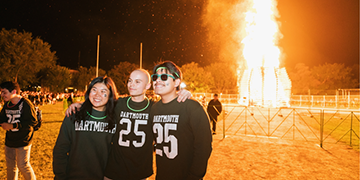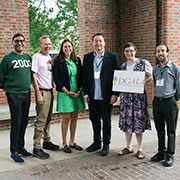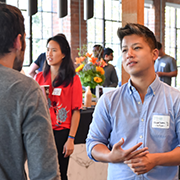“It’s in Their DNA to Want to Make an Impact”
Two research fellows focused on Native issues share their experience.
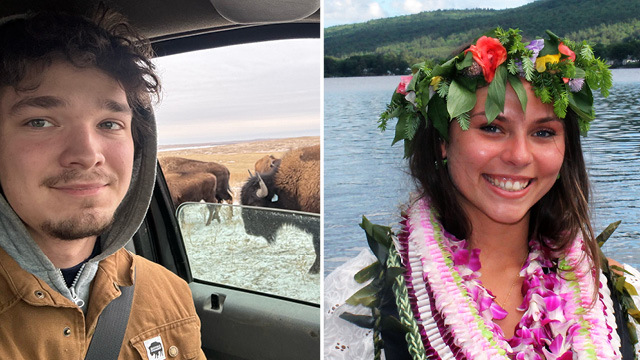
Jun 18, 2025
5 minute read
James Bressor
5 minute read
Harley Kell ’24 and Henry Eberhart ’24 have had distinctly different experiences during the past year working as research fellows through Dartmouth’s Tribal Services and Solutions Project. However, their fellowships have produced one shared result: Both want to pursue careers that will improve the lives of Indigenous people.
“The fellowship has been incredible. It has been a learning opportunity that I couldn’t have had without this program,” says Kell.
Dartmouth launched the Tribal Services and Solutions Project in 2022 to provide opportunities for students and recent graduates to work with Native American tribal leaders and help develop community-based solutions that address three critical needs: economic development; health care and public health innovation; and intergovernmental relations and policy.
The postbaccalaureate fellowship program is a capstone hands-on learning opportunity open to students who majored in Native American and Indigenous studies. With the fourth cohort recently announced, 13 graduating seniors have been named fellows.
“These are individuals who have a real hunger to serve our tribal communities. It’s in their DNA to want to make an impact,” says N. Bruce Duthu ’80, Samson Occom Professor, chair of the Department of Native American and Indigenous Studies, and the project’s faculty director. “They’re the kind of people we can easily envision as future leaders, in Indian Country particularly. They may end up working in government or the private sector, but they will have the concerns of Indian Country firmly in their hearts and their minds.”
Kell, an economics and Native American and Indigenous studies double major, grew up in Hawaii and is a member of the Oklahoma-based Citizen Potawatomi Nation. For her fellowship, she has worked at the Federal Reserve Bank of Minneapolis’s Center for Indian Country Development. Under the supervision of Casey Lozar ’03, vice president and the center’s director, she has focused on projects related to tribal public finance and Native access to capital, and she has authored an article summarizing some of her research.
Eberhart, an environmental studies and Native American and Indigenous studies double major, is the program’s first non-Native fellow. He has split his fellowship between two locations: the DuBray Family Buffalo Ranch on the Cheyenne River Sioux Reservation in South Dakota and a law office in Boulder, Colorado. The focus of his fellowship has been organic, free-range buffalo revitalization, including the establishment of a nonprofit organization.
Kell and Eberhart will complete their fellowships in June, and both will begin law school in the fall. Kell will pursue her law degree at Harvard, while Eberhart will be on the opposite coast, at UCLA. Here, they reflect on their fellowships.
Can you summarize your fellowship?
Kell: I’ve had the opportunity to work on many types of projects. One of my responsibilities has been to condense longer economic articles into 1,500-word web summaries that can be used by a policymaker or somebody who’s a little less familiar with complex economic language. One of the principal goals of the Federal Reserve Bank of Minneapolis is to produce information that helps inform public policy. We don’t take positions on policy questions. We don’t say, “Here’s what you should do.” We synthesize data and make it accessible to the broader public, including tribal leaders.
Eberhart: My fellowship has been a logical continuation of my senior thesis, which focused on what it would mean for buffalo ranchers to create more ethical, traditional, and respectful relationships with herds. There’s a big movement to kind of turn buffalo into cattle—put them in feedlots, fatten them up with grain, and make them big, brown, shaggy cows, which is culturally damaging. Through my fellowship, I’ve worked half the time here on the ranch and half the time at the law firm, helping to build a future centered around the culturally based, respectful management of buffalo.
What are some examples of specific work you’ve done?
Kell: I’ve been focused on a large-scale initiative called the Survey of Native Nations, which is an effort to provide high-quality research that increases understanding of tribal treasuries and the role that tribal governments play in local and regional economies. The survey also addresses a data gap in Indian Country by providing tribal governments with benchmark public finance data. We help securely collect and compile key revenue and expenditure data for tribal governments. State, county, and local governments have long had access to this sort of information, but tribal governments haven’t. In my research on unmet capital needs in Indian Country, I’ve learned that geographic isolation, lack of nearby financial institutions, and limited banking infrastructure contribute significantly to economic exclusion.
Eberhart: When I’m in Boulder, I’m basically a kind of research paralegal. I’ve worked with the managing partner at the firm and have done everything from researching treaty histories to traveling with clients to D.C. to meet with senators. When I’m in South Dakota, I’m a ranch hand. Every morning, I wake up and check on the herds. I grew up in the suburbs, and it has been incredible to help take care of these animals.
Which aspects of your fellowship have been especially rewarding?
Kell: Having the opportunity to meet tribal leaders. Sometimes the status quo is for researchers to focus our work on what interests us. I’ve enjoyed getting to know what the communities need and what research they want. My fellowship has also given me a better understanding of how economics is related to policy and Native issues.
Eberhart: Being able to live and work with a family that has dedicated their lives to the cause of buffalo revitalization has been an invaluable opportunity. There is no replacement for hearing stories and wisdom from those who have spent decades at the forefront of movements around issues that you care about. To the DuBray family, I am incredibly grateful.
What skills have you developed?
Kell: Some of the soft skills that have helped me think about balancing the very diverse needs across more than 500 federally recognized tribes. This has been especially important in our survey project, as we’re working with a huge range of tribes that have different government structures, revenue streams, and cultures.
Eberhart: Many of my learning experiences have been so different from one another. I have weeks when I’m primarily sitting at a desk all day broadening my understanding of law and policy, and then I’m on the ranch learning to drive a tractor.
Big picture—what is the value of the Tribal Services and Solutions Project and this fellowship?
Kell: It’s important for Dartmouth to meet its charter mission to educate Native youth. One important way to fulfill that is engagement in Indian Country—not just bringing Native students to our school. The fellowship program provides a bridge for Dartmouth to collaborate with and learn from Native communities through reciprocal relationships.
Eberhart: All credit to Dr. Duthu and the other faculty who pushed for this program. There’s only so much you can learn in a classroom. Living in a community strengthens our ability to develop effective policy ideas. What do people think about day to day? What do they care about?
Related Content
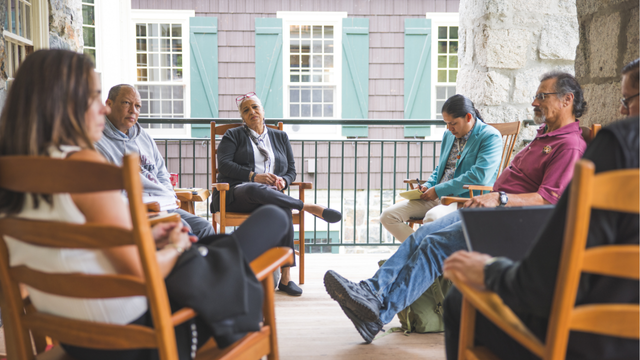
Dartmouth’s Second Tribal Leadership Academy Set for July
Insights into government relations and information sharing will highlight the week.
2 minute read


